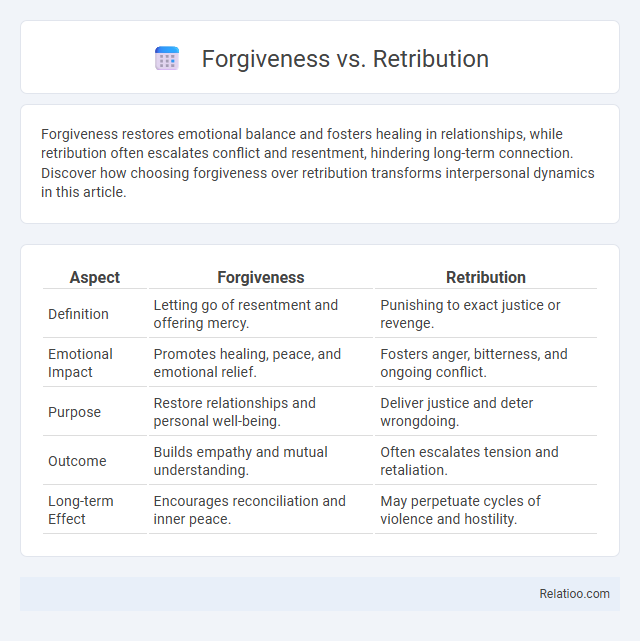Forgiveness restores emotional balance and fosters healing in relationships, while retribution often escalates conflict and resentment, hindering long-term connection. Discover how choosing forgiveness over retribution transforms interpersonal dynamics in this article.
Table of Comparison
| Aspect | Forgiveness | Retribution |
|---|---|---|
| Definition | Letting go of resentment and offering mercy. | Punishing to exact justice or revenge. |
| Emotional Impact | Promotes healing, peace, and emotional relief. | Fosters anger, bitterness, and ongoing conflict. |
| Purpose | Restore relationships and personal well-being. | Deliver justice and deter wrongdoing. |
| Outcome | Builds empathy and mutual understanding. | Often escalates tension and retaliation. |
| Long-term Effect | Encourages reconciliation and inner peace. | May perpetuate cycles of violence and hostility. |
Understanding Forgiveness: Definitions and Dimensions
Forgiveness involves consciously letting go of resentment or vengeance toward someone who has caused harm, encompassing emotional, cognitive, and behavioral dimensions. It differs from retribution, which seeks to impose punishment, whereas forgiveness fosters healing and emotional restoration without necessarily condoning the offense. Unconditional love supports forgiveness by offering empathy and acceptance independent of the offender's actions, promoting reconciliation and inner peace.
Retribution Explained: Justice or Vengeance?
Retribution is often misunderstood as mere vengeance, but it fundamentally represents a principle of justice aimed at restoring moral balance by ensuring that wrongdoers face consequences proportionate to their actions. This concept distinguishes between lawful punishment and emotional retaliation, emphasizing fairness and societal order over personal vendettas. Understanding retribution helps you navigate the complex interplay between justice and forgiveness, fostering more informed decisions about conflict resolution and healing.
Historical Perspectives on Forgiveness and Retribution
Historical perspectives on forgiveness reveal its roots in restorative justice practices across various cultures, emphasizing reconciliation and social harmony over punishment. Retribution, deeply embedded in ancient legal codes such as Hammurabi's Code, often justified proportional punishment to maintain order and deter wrongdoing. Philosophical discourses from figures like Confucius and Aquinas highlight forgiveness as a moral virtue that transcends rigid retributive justice, fostering healing and societal cohesion.
The Psychology Behind Forgiving and Retaliatory Behaviors
The psychology behind forgiving and retaliatory behaviors reveals that forgiveness involves emotional regulation and empathy, reducing stress and promoting mental well-being, while retribution stems from anger and a desire for justice or balance, often prolonging negative emotions. Neurobiological studies show that forgiveness activates brain regions associated with empathy and moral reasoning, whereas retaliatory impulses engage areas linked to threat detection and reward. Understanding these mechanisms aids in developing healthier coping strategies and fostering unconditional love, which transcends both forgiveness and retribution by embracing acceptance without conditions.
Cultural Influences on Attitudes Toward Forgiveness
Cultural influences profoundly shape attitudes toward forgiveness, with collectivist societies often emphasizing reconciliation and community harmony as integral to forgiveness. In contrast, individualistic cultures may prioritize personal justice and retribution, viewing forgiveness as a personal choice rather than a social obligation. These cultural frameworks impact the prevalence of unconditional love in healing processes, influencing whether forgiveness is extended unconditionally or contingent upon reparation.
Ethical Dilemmas: When Forgiveness Meets Retribution
Ethical dilemmas arise when forgiveness challenges the desire for retribution, creating tension between justice and mercy in moral decision-making. Forgiveness seeks to restore relationships and promote healing by releasing resentment, while retribution demands proportional punishment to uphold accountability. Unconditional love transcends both by advocating compassion without conditions, complicating the balance between ethical responsibility and emotional grace.
Forgiveness in Conflict Resolution and Reconciliation
Forgiveness plays a crucial role in conflict resolution and reconciliation by allowing parties to release resentment and foster healing without expecting retribution. This transformative process enables Your relationships to move beyond past grievances, promoting understanding and mutual respect. Emphasizing forgiveness over punitive measures cultivates lasting peace and emotional restoration.
Retributive Justice: Societal Functions and Consequences
Retributive justice serves as a societal mechanism designed to uphold moral order by ensuring that offenders receive penalties proportionate to their wrongdoings, reinforcing social norms and deterrence. Your understanding of this system highlights how it can create a sense of closure for victims while potentially perpetuating cycles of punishment without addressing underlying causes of behavior. The balance between forgiveness and retribution impacts community cohesion, influencing both rehabilitation prospects and justice perceptions.
Choosing Forgiveness: Benefits for Individuals and Communities
Choosing forgiveness promotes emotional healing and reduces stress by releasing resentment, which improves mental health and fosters resilience. Forgiveness enhances social harmony and trust within communities, creating stronger interpersonal bonds and reducing cycles of retaliation. Individuals who practice forgiveness contribute to a culture of empathy and cooperation, supporting collective well-being and conflict resolution.
Toward a Balanced Approach: Integrating Forgiveness and Justice
Balancing forgiveness with justice involves recognizing the need for accountability while fostering healing and reconciliation. Your ability to integrate retribution with unconditional love creates a foundation where fairness meets empathy, preventing cycles of resentment and promoting genuine restoration. Embracing this approach encourages transformative justice, allowing both victims and offenders to move forward with respect and dignity.

Infographic: Forgiveness vs Retribution
 relatioo.com
relatioo.com